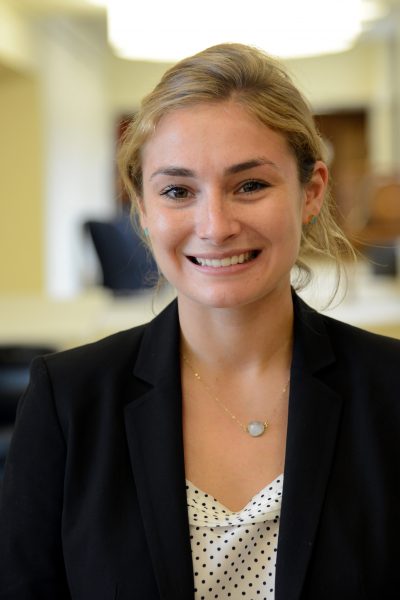Summer Experience: Maya Ginga ’19L goes In House for the Kraft Group
“I enjoy the process of reading case law that largely comprises 1L, but it felt vital to flex my understanding of the law in a “real world,” professional setting.”
Maya Ginga is a second year law student from Boston, Massachusetts. She graduated in 2014 from Elon University in North Carolina with a degree in Political Science. She spent two years in between undergrad and law school backpacking through South America and working for a bio-pharmaceutical company in Cambridge, MA. At W&L Law, she is a Kirgis Fellow, a staffwriter for the Washington and Lee Law Review and an executive board member of the American Constitution Society.
What did you do for work this summer?
This summer I interned for the in-house legal department of the Kraft Group in Foxborough, MA. The Kraft Group encompasses all of the Kraft family businesses, including the New England Patriots, the New England Revolution, Rand-Whitney Containerboard, and International Forest Products.
How did you find/get this position?
One of the in-house attorneys is a W&L Law alumna. She posted a summer internship position in our internal job portal (SCORE). I applied directly to her email, conducted a screening interview over the phone with the alumna, and then attended an interview in person a week later with all four in-house attorneys.
Describe your work experience.
My assignments varied greatly due to the Kraft family’s numerous companies. Most of the work I did was related to IFP, a lumber company that has two major sides to their business: trading and finance. The two long term projects I worked on were secured finance transactions with other lumber companies. Other smaller assignments included research projects, a settlement agreement, and a dispute concerning the New England Patriots’ stadium lease agreement with the Town of Foxborough.
What were some skills you developed this summer?
Namely, analytical thinking and verbal communication skills. First, I have no business background, so working on complex finance transactions was totally outside my comfort zone. That required me to think critically about the impact that adding or removing certain clauses would have on the business and legal relationship between the lender and the borrower. Second, I was encouraged to present my findings confidently and concisely. My supervising attorneys stressed the importance of communicating answers to the business in the most straightforward way possible.
What classes or experiences were useful in preparing you for the summer work?
Property and contracts were the most relevant to my summer work. Property because my class conducted a small unit on financing real property, and the secured finance transactions I worked on were a logical extension of similar principles. So while I have not taken a secured transactions course and I have no undergraduate experience in lending or securitization, I could lean on that background when grappling with the deals I worked on.
Contracts was helpful because the work I did was largely transactional and therefore involved drafting and editing contracts. Although I usually started from a template, I often had to add or remove provisions based on the deal. A lot of the concepts I learned in Contracts (i.e. integration clauses, risk of loss) cropped up in the work we did on a regular basis.
What surprised you about the work you did this summer?
I was surprised by how much legal research was involved in a transactional/corporate environment. I assumed that research was more relevant in a litigation role, but there were a number of legal issues I worked on that required legal research to understand the risk involved before entering into a deal or agreement.
What was your favorite aspect of this summer work experience?
Bringing to life a lot of the concepts I learned during my 1L year. I enjoy the process of reading case law that largely comprises 1L, but it felt vital to flex my understanding of the law in a “real world,” professional setting. It gave me the confidence that the transition from law school to working can be difficult, but rewarding.
Has this experience helped you figure out post graduate plans, and if so, how?
This summer’s job has helped me in a number of ways, some of them more specific than others. The General Counsel at Kraft played a significant role in my 2L summer employment, which hopefully will also connect me to my post-graduate plans. Specifically, he secured interviews for me at firms that I otherwise would not have had the opportunity to interview with. Because he spent the beginning of his career at a Boston law firm, he gave me a lot of insight into various firm’s cultures, strengths, and weaknesses.
More generally, the work I did this summer provided me the opportunity to discuss substantive corporate legal concepts during OCI interviews. All 1L summer experiences are great in their own way, but I was able to speak to corporate law and client relationships during interviews with firms whose clients are similar to the Kraft Group. Because I genuinely enjoyed my summer work to such an extent, it was easy for me to convey that excitement during interviews.
How do you think this experience will shape the rest of your time at W&L Law?
My summer experience gave me a realistic sense of what an in-house attorney does on a regular basis. Therefore, I’ve chosen my courses in keeping with the work I did this summer. For instance, Close Business Arrangements. Additionally, exercising confidence and clarity in my verbal communications will be especially helpful during 2L competitions.
 Maya Ginga ’19L
Maya Ginga ’19L
You must be logged in to post a comment.